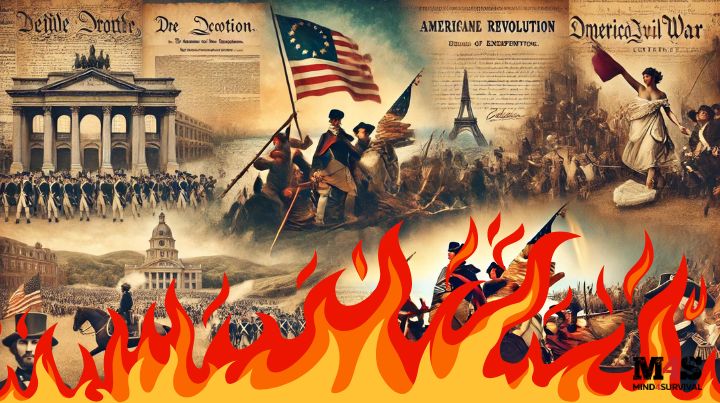Podcast: Play in new window | Download
Welcome to another episode of the Mind4Survival podcast! In today’s show, I’m tackling some crucial topics that are both timeless and incredibly relevant in our current world. I begin by exploring the common societal flashpoints that have historically led to revolutions and civil wars, from the French Revolution to the American Civil War. These flashpoints, such as social inequality, lack of political representation, and external pressures, often combine to create the perfect storm for societal upheaval.
But understanding these flashpoints is just the beginning. In the second segment, we focus on something more personal and actionable—creating a preparedness plan uniquely tailored to your life. Preparedness isn’t one-size-fits-all, and by the end of this episode, you’ll have the insights you need to build a plan that fits your specific needs, strengths, and circumstances.
Whether you’re interested in understanding the historical patterns that lead to societal change or you’re looking to take practical steps toward better preparedness, this episode has something for you. Let’s dive in!
Quick Look at What You’ll Learn
Societal Flashpoints
This first segment is about a topic as relevant today as it was centuries ago—societal flashpoints that lead to revolutions and civil wars. Revolutions don’t just happen; they result from deep-seated societal issues that, when left unaddressed, can tear a country apart. We explore three major historical events—the French Revolution, the American Revolution, and the American Civil War—to identify the common threads that run through them.
Key Points:
- Social Inequality and Economic Hardship: History shows that revolution or civil war may not be far behind when a significant portion of the population feels oppressed or unfairly treated. We discuss how economic hardship and social inequality were crucial in these revolutions and how similar tensions are evident today.
- Lack of Political Representation: Another major flashpoint is when people feel they have no voice in their government. The frustration that builds from a lack of political representation can explode into revolution, as seen in France, the American colonies, and the American South.
- External Pressures: External factors such as economic crises and global events often push society to its breaking point. We analyze how these pressures contributed to the revolutions we discussed and how they might be affecting our society today.
- Consolidating the Themes: We wrap up by looking at the common factors—social inequality, political disenfranchisement, and external pressures—that often combine to create a perfect storm, leading to revolutionary change. I also pose some thought-provoking questions about the current state of our society and what the future might hold.
Creating a Personalized Preparedness Plan
In the second segment, I shift gears to something more actionable—how to create a personalized preparedness plan that fits your life, needs, and goals. Preparedness isn’t one-size-fits-all, and I’ll guide you through the steps to tailor a plan that works specifically for you.
Key Points:
- Assessing Personal Needs: Preparedness is deeply personal. I discuss how to evaluate your family size, location, health considerations, and lifestyle to create a plan that’s truly tailored to your circumstances.
- Setting Realistic Goals: I emphasize the importance of setting small, manageable goals that build confidence and readiness over time. Whether it’s putting together an emergency kit, planning an evacuation route, or establishing a communication plan, setting realistic goals is critical to effective preparedness.
- Incorporating Personal Strengths and Preferences: Preparedness should enhance your life, not feel like a burden. I share tips on how to incorporate your strengths and preferences into your plan, making the process more enjoyable and sustainable.
- Adapting to Change: Life changes, and so should your preparedness plan. I discuss the importance of regularly reviewing and adjusting your plan to ensure it stays relevant as your circumstances evolve.
- Celebrating Milestones: Finally, I discuss the importance of celebrating your progress. Every step toward preparedness is a step toward greater peace of mind.
The Bottom Line
As we wrap up today’s episode, I hope you’re walking away with a deeper understanding of the societal forces that can lead to revolutions and civil wars, as well as practical steps to create a preparedness plan tailored to your unique situation. History has shown us repeatedly that when certain flashpoints are ignored, the consequences can be severe. But by taking the time to understand these patterns and preparing ourselves, we can face the future with confidence.
Now, I want to hear from you. What are your thoughts on the current state of our society? Do you see any parallels with the historical events we discussed today? And more importantly, what steps are you taking to ensure you and your family are prepared?
Leave a comment below or join the conversation on our social media channels. Your insights could help others who are on their own preparedness journey. If you found value in today’s episode, please share it with your friends and family, and don’t forget to subscribe so you never miss an episode.
Additional Resources
Stay safe,

Read the full article here



